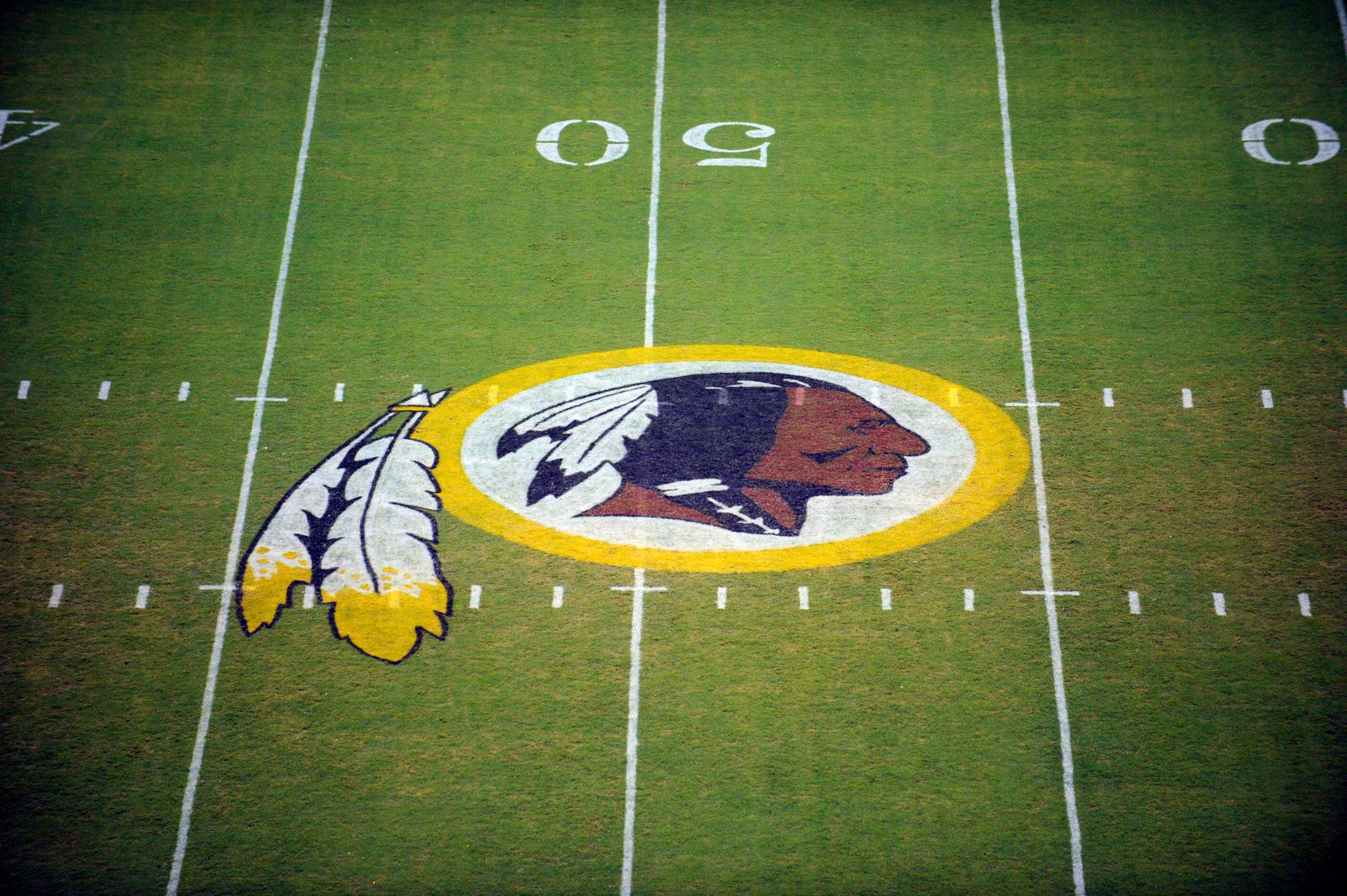- On Monday, the NFL’s Washington Redskins announced the team would be getting a new name, after an interal review of the brand.
- The word “redskin” is a racial slur for Native Americans.
- The team has yet to announce the team’s new name.
- This comes amid growing pressure from corporate sponsors and activists, as well as recent changes to other brands such as Aunt Jemima, who was fashioned after a racist depiction of Black female slaves.
- The Washington Redskins team is not the only problematic brand that’s been a staple in American culture.
- Visit Business Insider’s homepage for more stories.
The NFL’s Washington Redskins will soon be getting a new name after an internal review, it was announced Monday. The word “redskin” is a racist slang term for America’s indigenous people.
This comes after mounting pressure from activists and corporate sponsors alike, especially in the wake of the killing of George Floyd, which has prompted conversations about race and power nationwide. The team’s owners and NFL commissioner Roger Goodell had previously defended the use of the word and the logo, which depicts a Native American.
Recently, however, FedEx, one of the team’s top sponsors and the holder of its stadium naming rights, released a statement asking the team to change its name. It also later threatened to not pay its $45 million in contract fees if the name was not changed, The Washington Post’s Les Carpenter and Mark Maske report. Additional sponsors, including PepsiCo, Nike, and Bank of America, made similar demands, per the Post.
The Washington Redskins were founded in 1932 as the Boston Braves. The team changed its name to the Redskins in 1933.
The new name has not yet been announced, but the team's statement said that team's owner Daniel Snyder and head coach Ron Rivera "are working closely to develop a new name and design approach that will enhance the standing of our proud, tradition rich franchise and inspire our sponsors, fans and community for the next 100 years."
The football team is certainly not the only popular American brand with a problematic past. Here are several other racist names and depictions that were once considered household staples.
Katie Richards, Kim Bhasin, Aaron Taube, and Karlee Weinmann contributed to an earlier version of this article.

Quaker Oats, a subsidiary of PepsiCo, announced on June 17 that it will retire its Aunt Jemima brand of syrup and pancake mix, saying the company recognizes that "Aunt Jemima's origins are based on a racial stereotype."
In the late 1800s, the Missouri newspaper editor Chris L. Rutt decided to name his brand of self-rising flour after "Aunt Jemima," a song performed by minstrel actors. A former slave named Nancy Green was later hired to portray Aunt Jemima as a "mammy," a racist caricature that depicts female slaves as smiling, happy homemakers for white families.
"We recognize Aunt Jemima's origins are based on a racial stereotype," Kristin Kroepfl, vice president and chief marketing officer of Quaker Foods North America, said in a press release. "As we work to make progress toward racial equality through several initiatives, we also must take a hard look at our portfolio of brands and ensure they reflect our values and meet our consumers' expectations."
Kroepfl said the company has worked to "update" the brand over the years to be "appropriate and respectful," but it realized the changes were insufficient.
Hours after Quaker Oats announced it was changing its Aunt Jemima logo, Mars, which makes the boxed rice product Uncle Ben's, said it plans to change the product's "brand identity."
Uncle Ben, 1946-Present

Company: Uncle Ben's
Uncle Ben's, a rice and grains company, adopted its brand name and logo in 1946. According to the company's website, the name "Uncle Ben" is that of a Black Texan rice farmer and the image is of a Black Chicago chef and waiter named Frank Brown.
Uncle Ben has a "contentious history," Stuart Elliott wrote in a 2007 New York Times piece recently cited by Delish. "White Southerners once used 'uncle' and 'aunt' as honorifics for older blacks because they refused to say 'Mr.' and 'Mrs.,'" he said.
Earlier in June, hours after it was announced that Aunt Jemima's logo would be changed, Uncle Ben's parent company Mars announced that it will be "evolving" its branding, too.
"As we listen to the voices of consumers, especially in the Black community, and to the voices of our Associates worldwide, we recognize that now is the right time to evolve the Uncle Ben's brand, including its visual brand identity, which we will do," they said in a statement.
Source: Delish, Uncle Ben's, The New York Times
Eskimo Pie, 1921-Present
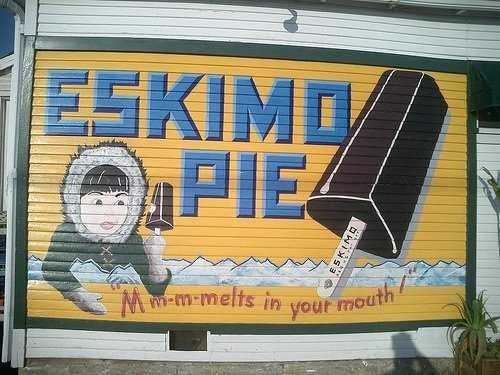
Company: Dreyer's Grand Ice Cream
The ice cream treat named for a North American tribe became the subject of controversy in 2009 when a Canadian Inuit woman said the product name insulted her heritage. A slow-moving and largely unpublicized battle in North America's northland has quietly raged on against the use of the word "Eskimo" to describe people with Inuit and Yupik heritage.
The word "Eskimo" has derogatory connotations stemming from non-native settlers who colonized areas of the Arctic, Business Insider reports.
Recently, it was announced that Eskimo Pie, a Dreyer's Grand Ice Cream product, will change its name and marketing after acknowledging its problematic origins, The New York Times reported.
Sources: The Toronto Star, Business Insider, The New York Times.
Mrs. Butterworth, 1961-Present
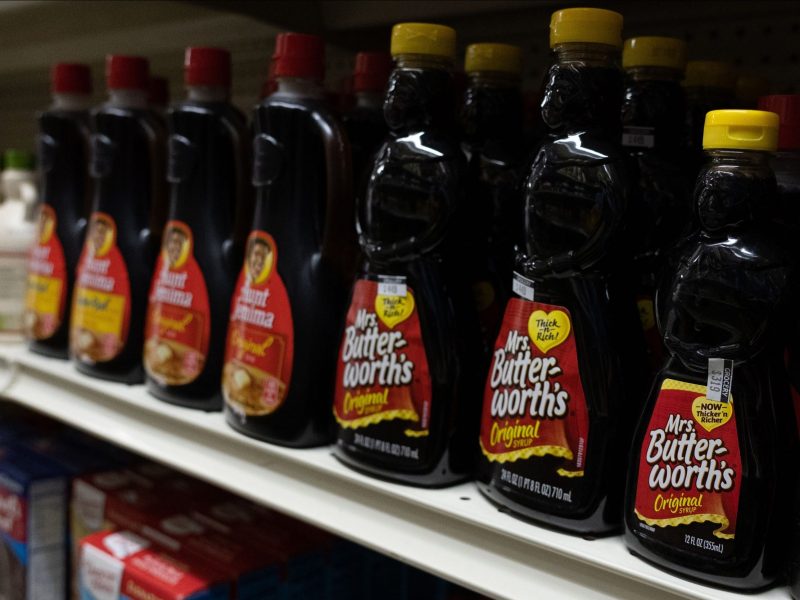
Company: Mrs. Butterworth's
Syrup and pancake-mix company Mrs. Butterworth's adopted the personality of "Mrs. Butterworth" in 1961.
For years, the shape of Mrs. Butterworth's syrup bottles has been a point of contention. "Critics have long associated the shape of the Mrs. Butterworth's bottle with the mammy, a caricature of black women as subservient to white people," Maria Cramer wrote.
Conagra Brands, the parent company of Mrs. Butterworth's syrup and pancake mixes, has also released a statement saying that they have started a review of the brand and packaging.
"The Mrs. Butterworth's brand, including its syrup packaging, is intended to evoke the images of a loving grandmother. We stand in solidarity with our Black and Brown communities and we can see that our packaging may be interpreted in a way that is wholly inconsistent with our values," they said.
Source: Conagra Brands
The Washington Redskins, 1933-Present

Sports team: The NFL's Washington Redskins
Source: Business Insider, The Guardian, The Washington Post
Chief Blackjack, 1928-1987

Organization: St. John's University
The Queens, New York-based college began calling its sports teams the Redmen in the early 1920s and adopted the Chief Blackjack mascot in 1928 when two students found a statue of him outside a cigar store.
The school used a variant of the logo you see here up until 1987, finally ditching the Redmen name in 1994 after pressure from Native-American groups. The school's teams are now known as the Red Storm.
Source: St. John's University, Jay Rosenstein Productions, New York Times
Rastus, 1901-1925
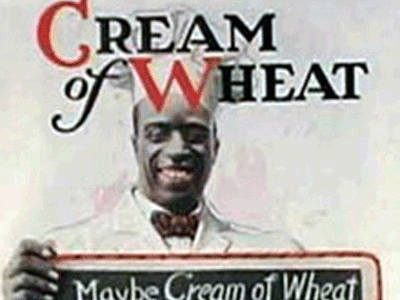
Company: Cream of Wheat
Since the 1880s, Rastus has been widely considered a pejorative term associated with black men. Through advertisements from the first part of the 20th century, the smiling chef is depicted as childlike and uneducated.
Cream of Wheat took Rastus off the box in 1925 in favor of a portrait of Frank L. White, a Chicago chef who remains on the box to this day (pictured above).
On Wednesday, B&G Foods, the parent company of Cream of Wheat, issued a statement announcing its plans to conduct an immediate review of the brand's packaging.
"We understand there are concerns regarding the Chef image, and we are committed to evaluating our packaging and will proactively take steps to ensure that we and our brands do not inadvertently contribute to systemic racism. B&G Foods unequivocally stands against prejudice and injustice of any kind," they said.
Source: The Jim Crow Museum Of Racist Memorabilia, Adweek, Business Wire
Miss Chiquita, 1944-Present
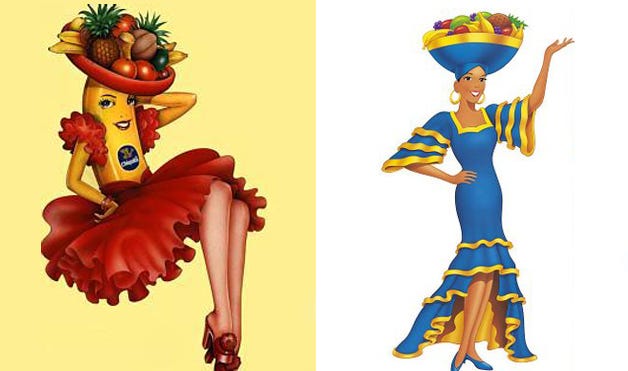
Company: Chiquita
Originally a sexy banana, the mascot is now a sexy banana seller. She wears a Carmen-Miranda-esque fruit hat that gives an exotic and idealized image of the tropics.
Source: Chiquita
Syracuse University's Big Chief Bill Orange, 1931-1978

Organization: Syracuse University
Before the private university looked to Otto the Orange for a boost of school spirit, Syracuse University's mascot was Big Chief Bill Orange, the Saltine Warrior.
A statue of the Saltine Warrior was erected on the campus in 1951 and still stands today. In 1978, students in the Syracuse community and members of a Native-American organization protested the use of this mascot.
Eventually the Saltine Warrior was retired along with the costume worn by the mascot.
Source: Syracuse University Archives
Frito Bandito, 1967-1971
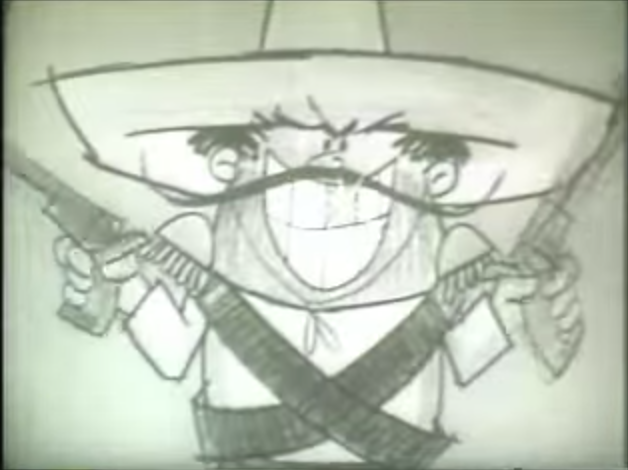
Company: Fritos
Speaking broken English and robbing unsuspecting bystanders, the Frito Bandito was an armed Mexican conman with a disheveled look and a gold tooth.
Responding to pressure from the Mexican American Anti-Defamation Committee, the snack-food giant cleaned up Frito Bandito's look. But combed hair and a friendlier expression didn't quite cut it.
Fritos ditched the cartoon, and a less controversial band of cowboys, the Muncha Bunch, replaced him.
Source: "On the Media"
Land O'Lakes butter, 1928-2020
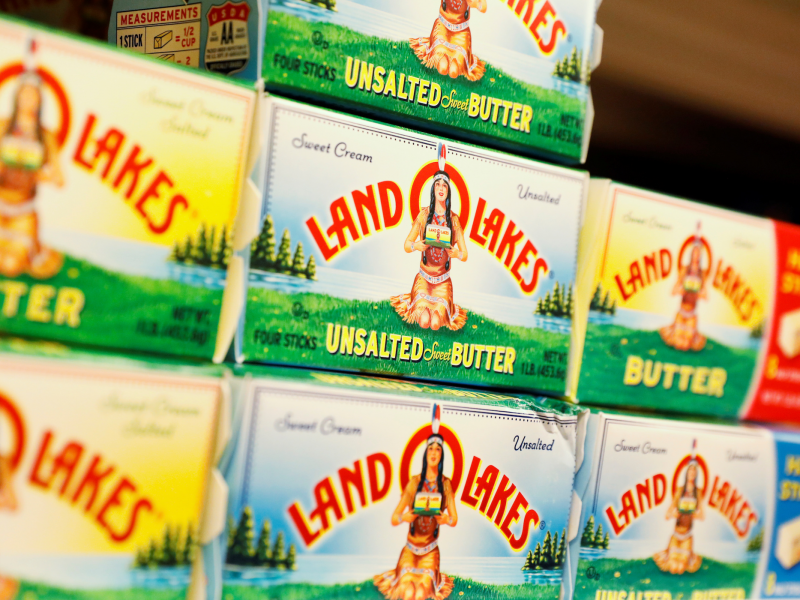
Land O'Lakes recently changed the packaging for its consumer products to remove the image of a Native American woman with a feather in her hair.
The change was implemented ahead of the company's 100th anniversary. The new packaging is very similar to the original, save for the removal of the Native American woman. It also added the phrase "farmer-owned" above the Land O'Lakes name.
Source: Business Insider
Chief Wahoo, 1947-2018
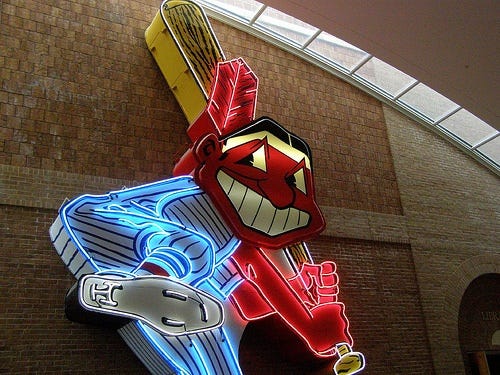
Company: Cleveland Indians, Major League Baseball
The Indians announced plans to remove the logo from their uniforms in 2018. The move came after decades of protests and complaints that the grinning, red-faced caricature used in one version or another since 1947 was racist. However, the controversial mascot can still be found on merchandiseselling at the ballpark.
Source: The Associated Press
Sambo, 1957-1981

Company: Sambo's
When restaurateurs Sam Battistone and Newell Bohnett launched Sambo's, they insisted its name had nothing to do with a children's book of the time, "The Story of Little Black Sambo."
But the businessmen capitalized on the association, with "Little Black Sambo"-inspired decor.
In the late 1970s, the chain had 1,200 locations in 47 states. After some backlash, a name change and an attempt at an identity makeover, it went bankrupt in 1981.
Source: Slate
Funny Face Drink Mix, 1964-1965

Company: Pillsbury
When Kool-Aid started dominating the refreshment market, Pillsbury decided to create its own competing brand: Funny Face.
Injun Orange and Chinese Cherry are actual varieties of Funny Face, and the racist overtones didn't stop at the names: Caricatures accompanied each of the flavors.
Pillsbury eventually swapped out its original varieties for Jolly Olly Orange and Choo Choo Cherry on its own.
Source: Slate
Crazy Horse malt liquor, 1992-2001

Company: Stroh Brewery
Though the real Crazy Horse may have advocated abstinence, that didn't stop Stroh Brewery from capitalizing on his recognizable name and image - as well as the popular stereotype that Native Americans are heavy drinkers - with this malt beverage.
The company had to backpedal after its product inspired serious outrage from Crazy Horse's estate and the Rosebud Sioux Tribe. In 2001, Stroh apologized in a ceremony on the Rosebud Reservation.
Crazy Horse is still on the market, but under the name Crazy Stallion.
Source: Slate
